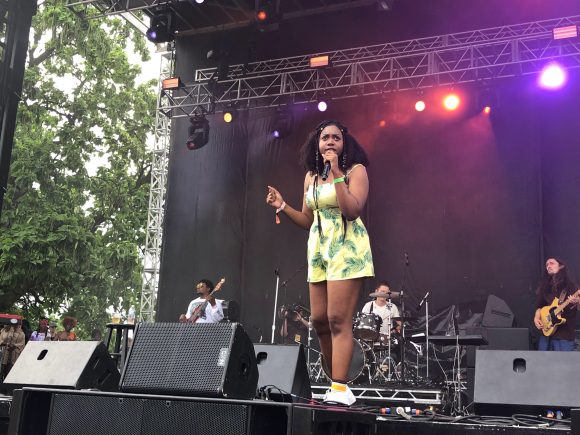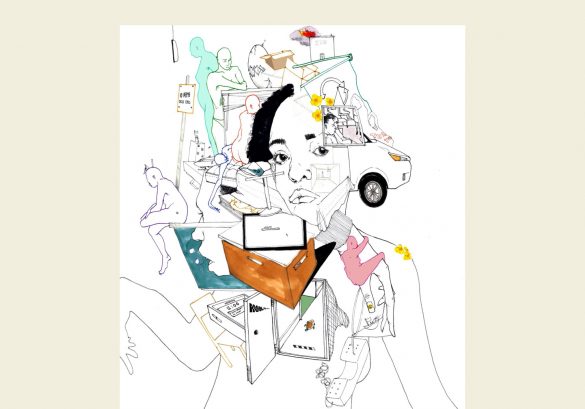
Noname performing at Pitchfork. (Shruti Kaul/CU Independent)
Noname’s latest album, Room 25 is really, really good.
On her sophomore effort, the self-professed “lullaby rapper” infuses her music with the same honesty, delight and despair that fills her debut, Telefone. However here, we see Noname really stretch her wings and assert herself.
In terms of instrumentation, the album embraces the sound of her live performances. Her collaborator Phoelix’s production style shifts from Telefone, incorporating elements from genres like jazz and funk to culminate in a looser, freer sound.
The album is littered with features from heavy hitters like Ravyn Lenae, Smino and Saba, who function as Noname’s chorus as she delivers verses with wit and tenderness. Somehow, Noname preserves her voice and prowess while lending out the album as a playground for the sounds of the Chicago rap scene. In Room 25 and as an artist, she asserts and thrives, but creates room for collaboration. If Chance the Rapper is the patron saint of Chicago, Noname is the beloved mayor the city deserves.
A lot of people are obsessed with comparing her to other female rappers, but this balancing act of individual and collaborative sound strikes as the true embodiment of her femininity. On opening track “Self”, she expertly moves between boasting about how she “fucked your rapper homie, now his ass is making better music”, waxing poetic about her pussy’s distinguished accolades to praying that her granny doesn’t forget her. Her simultaneous vulnerability and confidence provide depth to the femininity we see in rap today.
In comparison to the relatively celibate Telefone, Room 25 brings newly discovered sexuality. She’s learned what her pussy can do, bragging that her “pussy wrote a thesis on colonialism”. She even talks about sex in a different way than most of her femme counterparts. Her femininity exists outside of marketing conventions of femme-rap heavyweights today who tend to use a lot of sexual imagery. Noname’s sexuality operates separately from the forces that made Nicki Minaj’s Anaconda blow up.
Noname continues to meditate on the troubles that still plague her, like the “black death” detailed in Telefone’s “Yesterday”, an ailment that still keeps her up and has turned her into an “insomniblack.” As always, Noname’s blackness is at the forefront. From samples about revolution to explicitly stating “darkness lingers in the wake of slavery,” Noname speaks to the rot in this country.
As the album progresses, Noname seems to let audiences know how lucky we are that she lets us in. On “Don’t Forget About Me”, she takes us through drug use in L.A. and sad realizations—“secrets is I’m really broken”. She plays with personal revelations with awareness and mischievousness. With the help of Smino and Saba, she reveals on “Ace” that she’s “just writing my darkest secrets like wait and just hear me out,” and admits that “nobody really know me.”
Noname plays and prods her way through conversations on violence, salvation and sex. If this album was its dissertation, somebody give her pussy a PhD.



Contact CUI Arts Writer Shruti Kaul at shruti.kaul@colorado.edu.
